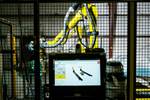Plataine AI enhances large-scale manufacturing scheduling, planning
AI-based production scheduler delivers on users’ short- and long-term strategic task planning with Practimum-Optimum algorithm.
Plataine (High Point, N.C., U.S.) reports that its AI-based production scheduler, Practimum-Optimum, has set new records for fully automatic, optimized manufacturing scheduling in large scale and complex real-life scenarios.
According to the company, the Practimum-Optimum scheduler routinely handles demand sets with more than 10,000 tasks, generating optimal schedules completely automatically. This scale and performance specifically stand out with complex operations involving multiple production lines, special machines such as autoclaves, multiple tool types and variable raw materials, as well as human capacity considerations and shift structures for various resources. All these elements are connected by a complex set of operational requirements and constraints.
Compared to the majority of currently available scheduling products that max out at hundreds of tasks in fully automatic mode, Plataine contends that its scheduler’s ability to support short- and long-term goals enable customers to make strategic decisions on staffing, equipment procurement and supply chain management, resulting in on-time delivery while resolving potential capacity issues.
These capabilities are enabled by machine-self-learning mechanisms that are integrated into the Practimum-Optimum algorithm. By learning patterns in the scheduling space, they focus on the most promising areas of high-quality schedules, thus significantly accelerating the convergence to the optimal schedule presented to the user.
Recognizing that mathematically optimal schedules are not always practically optimal, Plataine’s scheduler allows users to request changes to “practicalize” the schedule. Leveraging unsupervised machine learning algorithms, these micro changes are integrated into the holistic optimal schedule in a way that minimizes the degradation of the macro-goal scores.
Related Content
-
Siemens Gamesa, Airborne develop automatic preforming robot system for offshore wind blades
Danish-funded ALMA project furthers collaboration, adds new functionality, advanced sensor systems and digital twinning for reduced man-hours, waste and cost per blade.
-
Adaptive composite elements for building facades exhibited at JEC World 2023
University of Stuttgart institutes use carbon and glass fiber composites, robotic fabrication, biomimetic design and digial twin/control to demonstrate adaptive facade elements for future buildings.
-
Com&Sens presents workshop on fiber optic sensing for COPVs
Three-day hands-on workshop from June 11-13 in Leuven, Belgium, will equip participants with a better understanding of fiber optic sensing technology for digital manufacturing of composite tanks.















.jpg;maxWidth=300;quality=90)
